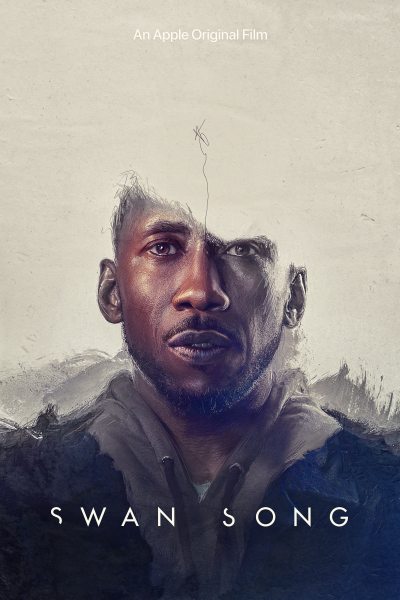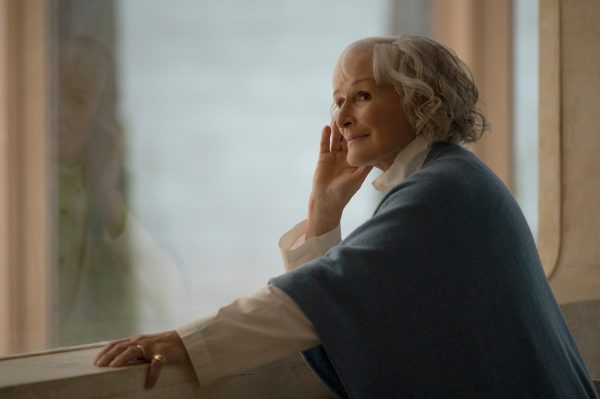
“Swan Song” (2021). Cast: Mahershala Ali, Naomie Harris, Awkwafina, Glenn Close, Nyasha Hatendi, Adam Beach, Lee Shorten, Dax Rey. Director: Benjamin Cleary. Screenplay: Benjamin Cleary. Web site. Trailer.
All too often, we’re faced with difficult situations that pose us with perplexing choices. Evaluating the options can be dizzying, leaving us feeling as though we can’t decide. Because of this, we may often default to what appears to be the most expedient choice, a move that frequently gives us an easy out – “I didn’t have any choice in the matter” – in case things don’t unfold as planned. In the alternative, we may remain indecisive, leaving us with no viable solution to the issue at hand. But those fallbacks are innately insufficient, because we always have the power of choice at our disposal; in fact, it’s incumbent upon us to act on it. All we need do is consider our options, deliberate the matter and proceed with making a decision that appears to be our best choice. Such are the circumstances of a troubled protagonist in the new sci-fi drama, “Swan Song.”
Time is running out for Cameron Turner (Mahershala Ali). The young father and husband has been diagnosed with a terminal illness, one that he’s been able to conceal rather effectively from his wife, Poppy (Naomie Harris), and son, Cory (Dax Rey). However, as the disease progresses, it’s becoming increasingly difficult to hide his condition; seizures, fainting spells and mild hemorrhaging are occurring with greater frequency and without warning, making it hard to pretend that there’s nothing wrong. Yet Cameron is reluctant to say anything for fear of the devastating impact it will have on his family, particularly his wife. The couple has just recently begun to recover from a period of grieving brought on by the sudden death of Poppy’s twin brother, Andre (Nyasha Hatendi), a time characterized by emotional distancing that nearly caused the dissolution of their marriage.
Fortunately, though, there may be a solution to help ease the potential suffering Cameron’s family would experience with his impending passing. Given that this is the near future, science has progressed to a point where a recently developed technology offers the prospect of shielding families like Cameron’s from the pain that would ordinarily be expected to accompany the death of a loved one. Thanks to the research of Dr. Jo Scott (Glenn Close), Cameron has an opportunity to replace himself with a replicated double, essentially a clone who’s virtually identical physically and genetically to its original, including transferred memories and sentience.
Cameron is intrigued but unsure about the prospects of proceeding with this plan. For starters, for it to be effective, he cannot say a word about it or his illness to Poppy and Cory. Dr. Scott says that this is the only way to ensure a seamless transition at the time when the original Cameron is replaced by his successor. And, given the progression of Cameron’s condition, the time frame is quickly shortening.

On top of this, however, the plan troubles the patient in several other respects. For example, will Cameron’s replacement provide a sufficiently convincing substitute? To help allay those concerns, Dr. Scott suggests that Cameron meet one of her previous test subjects, Kate (Awkwafina). The patient, who’s nearing the end of her life and now lives at Dr. Scott’s research facility, has already been replaced by her substitute with the subject’s family. Both the replacement and her relatives are oblivious that any kind of switch has been made, something that Dr. Scott encourages Cameron to see for himself.
But, even with that confirmation, Cameron still has his doubts. Is he truly doing something to benefit his family? Or is he seeking to pull off a grand deception that he can’t bring himself to live with, one that could be looked upon as the ultimate cruel joke? What’s more, even though he knows that his artificially generated self is essentially “him,” can he realistically stand by and watch someone whom he perceives as another individual step in to what has been his life and take over the role that he has been fulfilling, especially given the intimate nature involved?
To address that issue, Dr. Scott and her coordinating colleague, Dalton (Adam Beach), recommend a series of sessions in which Cameron and his activated doppelganger converse and become acquainted. The researchers hope that, once Cameron interacts with his successor, any apprehensions he might have will be dissolved once he has an opportunity to see how convincing his own replacement is. But will that be enough to allay his fears? And, with the time for potential substitution fast approaching, will the original have sufficient time to be able to say a veiled farewell to his family before returning to the research facility to live out his days? Those are the questions that all concerned must address while time still permits. And, of course, the key question is, “What will Cameron ultimately choose?”

It would seem that Cameron is faced with quite a dilemma, and he’s having considerable difficulty sorting it out. So what is he to do? Ultimately it all comes down to his beliefs, for they will dictate how events unfold as part of the conscious creation process, the philosophy that maintains we draw upon these resources in shaping our existence. The problem here, however, is that Cameron isn’t sure what he believes, and that’s playing havoc with his decision-making process.
What Cameron needs to understand is that the outcome will depend on the beliefs that govern his power of choice. That’s quite a potent force, too, given what it ultimately makes possible. But, when we’re unable to decide what we want, we’re stuck in limbo, and that nearly always results in a lack of resolution. Indeed, if we’re not able to get behind a particular desired outcome, nothing often happens. It’s as if we’re trying to manifest a specific result – and not trying to manifest that result – simultaneously. The outcome is a stalemate because the contradictory beliefs at work cancel each other out. And that, regrettably, leaves Cameron no closer to a satisfactory resolution.
So how does one resolve a situation like this? It calls for looking deep within to see what beliefs our authentic self is embracing. This is what Cameron clearly needs to do. He must frankly ask himself, “What do I really want?”
Given the magnitude of this decision, Cameron is wise to be as deliberative as he is, despite the frustration he might be experiencing in coming to a definitive conclusion. For example, he’s obviously torn in terms of trying to determine whether following Dr. Scott’s recommendation would ultimately be helpful or hurtful. Would he be doing something to successfully stifle Poppy’s pain, the kind of anguish she experienced with the loss of her brother only magnified many times over? Or would he be committing a grand deception that he couldn’t live with? That’s certainly a weighty question – and one in which he can readily see the impact that would flow from each choice.

In ethical stand-offs like this, it helps to understand how the beneficiary of a decision like this might feel. If Poppy doesn’t realize what’s transpiring and is allowed to continue living her life with the same sort of happiness she’s long enjoyed with Cameron, is she really being hurt if he agrees to proceed with the replacement process? Would she truly feel hurt if she knew what Cameron was contemplating, especially since it would be done out of his love for her and his desire to spare her the pain she’d experience with full knowledge of what he was actually going through? After all, wouldn’t this be the kind of “final gift” that we’d all like to be able to bestow upon our loved ones?
To a great degree, this is why Dr. Scott urges Cameron to meet Kate’s replacement to see how well she has integrated herself into the life of her predecessor. It might not cement his decision, but it could go a long way toward influencing it. Admittedly, Dr. Scott has a vested stake in this as someone who wants to see her work furthered. But, at the same time, she obviously cares a great deal about what can come from a procedure like this. After all, if she didn’t feel that way, she probably never would have worked at developing this technology in the first place, especially when she can see the potential good it can do.
But, even after seeing Kate 2.0 in action, Cameron is still not fully convinced. And that’s why he also needs to spend time in the company of the original Kate to try and determine why she decided to go through with the replacement procedure. It’s also why he needs to spend time in the company of his own replacement to see how closely his successor comes to matching his looks, beliefs, memories and other attributes. Perhaps these interactions will help him to reach a decision, something he obviously needs to do – and soon.

In the end, however, cases like this require one to not only examine one’s own beliefs, but also to assess those held by the loved ones that one is trying to help. If Cameron genuinely knows his wife as well as he believes he does, this should help to guide him in making a final decision. But, no matter which way he ultimately leans, Cameron must understand that his decision will be the product of a co-creation between himself and Poppy, something that one would hope would give him some peace of mind. The key consideration for Cameron is, “What would provide the most satisfactory outcome for all concerned?” – and then hope that whatever decision he makes will bear that out. If he knows his loved ones as well as he claims to, reaching that decision should eventually come to him without hindrance and with a sense of reconciliation, provided he trusts himself and places trust in what he believes are the views of others.
The inevitability of death – and the effort to manage (possibly even forestall) the fallout that comes in its wake – is a serious matter for us all, one that truly deserves profound contemplation, the kind that’s rarely seen in the movies. But that’s where writer-director Benjamin Cleary’s debut feature steps forward. This moving sci-fi offering poses a variety of deep questions and an array of moral dilemmas for a man who wants to do right but is unsure how to handle his circumstances. While the film suffers from some occasional pacing issues in the first half, it nevertheless delivers a number of affecting moments as the picture moves toward its heart-tugging conclusion, providing touching dramatic moments not often seen in films of this genre. The picture’s gorgeous cinematography and clever special effects add elements of beauty and whimsy to the powerhouse performances of its superb cast, most notably that of Golden Globe Award nominee Mahershala Ali, who turns in yet another dynamite portrayal, easily one of the best male lead roles of the year. “Swan Song” may not make for light, fluffy fare, but it certainly is one of the most thought-provoking and important films of 2021. The film has been available in limited theatrical release and can be seen via streaming online.
When we’re approaching our final act, we’re often faced with some of the most significant decisions we’ll make during our entire lifetimes. Consequently, the choices associated with those matters are crucial for determining what becomes of us, our legacy and our surviving kindreds. Given their importance, we can’t allow ourselves to wallow in indecision or table the issues for another time, simply because, barring a miracle, there won’t be another time. In that case, then, we must muster up the courage, conviction and commitment to make use of our power of choice while we still have the time and the wherewithal to do so. As in Cameron’s case, there may be a lot riding on what decisions we make and how they’ll affect the loved ones who’ll carry on in our absence – regardless of whether or not they know the truth behind it.
Copyright © 2021-2022, by Brent Marchant. All rights reserved.

No comments:
Post a Comment